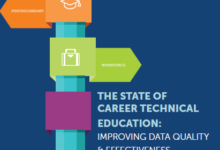Digital literacy and computer science skills are increasingly necessary for success in today’s workforce, even in fields that are not directly related to information technology. As such, state leaders are recognizing the role that a robust computer science education strategy plays in preparing learners for their future careers.
This report from BNY Mellon — with support from MassCAN, EDC, Code.org, ECEP, Sagefox Consulting Group and the Education Commission of the States — summarizes progress across all states toward writing, adopting and implementing statewide computer science standards. The report identifies best practices and identifies common challenges across the United States related to ten policy priorities:
- State Plan for K–12 Computer Science Education;
- State-Level Initiatives to Address Diversity in Computer Science Education;
- Adoption of K-12 Computer Science Standards;
- State-Level Funding for K-12 Computer Science Education;
- State Computer Science Teacher Certification;
- State-Approved Pre-Service Teacher Preparation Programs at Institutions of Higher Education;
- A Dedicated State-Level Computer Science Position;
- A Requirement for All High Schools to Offer Computer Science;
- Computer Science Can Satisfy a Core High School Graduation Requirement; and
- Computer Science Can Satisfy a Core Admission Requirement at Postsecondary Institution.







